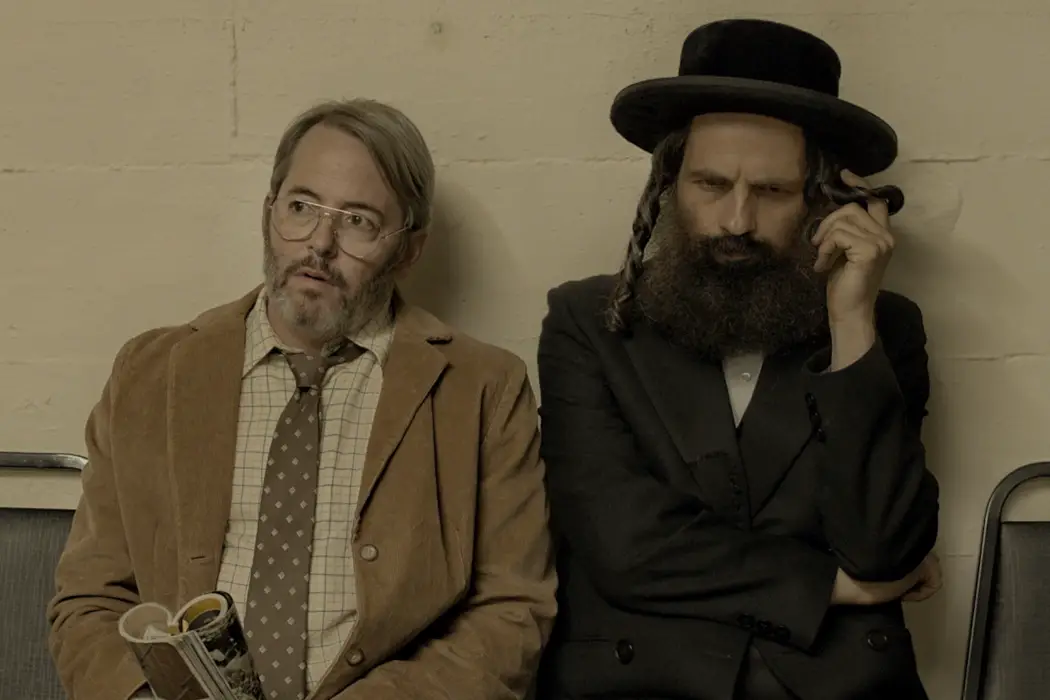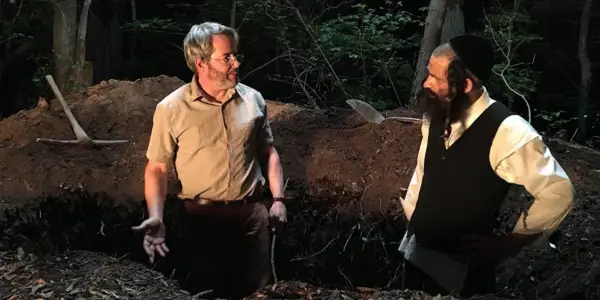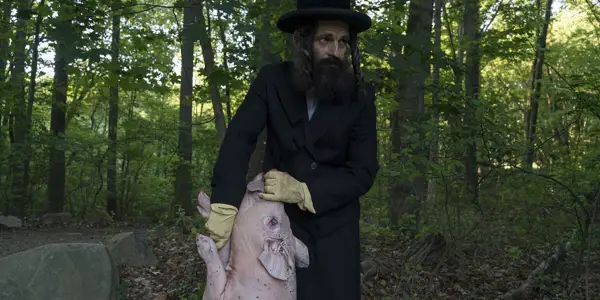TO DUST: A Brilliantly Delivered, All Encompassing Experience Of Grief

Stephanie Archer is 39 year old film fanatic living in…
Grief is an emotional aspect of life we have all had to face at sometime or another. Whether it be the loss of a beloved family pet, a close relative or comforting those who have just experienced a loss, in some form, grief has found us – yet the means by which we cope differs greatly to each person. To Dust, from director and co-writer Shawn Snyder, is the latest film to tackle this emotion, delivering a brilliantly executed depiction of grief and coping.
To Dust‘s take on grief and the means of coping is strangely relatable, if anything, completely understandable. It is as lighthearted as it is serious. This is the first time the subject of grief has found an effective punch without drowning audiences with its subject matter. You will cry and feel for the characters, yet you will also laugh, their journey through grief an all encompassing experience.
Ashes to Ashes and Dust to Dust
Shmuel (Géza Röhrig) has lost wife. A Hasidic Jew, she has been swiftly laid to rest, and the process of moving forward has slowly begun to be the expectation of his family and community. Yet, Shmuel finds it difficult to move forward, and as the months pass, his subconscious is invaded with dreams of his wife’s decomposing body and his mind filled with questions. His religion believes it is a sin for him to seek out the answers to the questions he is formulating, and as a result his grief becomes his purgatory. Unable to move forward, he begins to seek out the answers to the question he holds so dear: What will happen to his wife’s body?

Seeking absolution, knowing only answers and understanding will give him the tools he needs to move forward, Shmuel begins to visit Albert (Matthew Broderick), a professor at the local community college who is reluctantly drawn into Shmuel’s mission for peace. As the two embark on their own science experiment involving the process of decomposition, they both find a new understanding of themselves, science and the power of knowledge.
Visual Striking, Perfectly Performed
When To Dust begins, as well as throughout its entirety, it is the visuals that immediately take hold. The foot peering past the door frame, belonging to his now deceased wife, the only view Shmuel is awarded before the burial ritual begins, this image of the foot carrying through in the minds of the audience, the visuals that follow and the psychosis surrounding his grief. When you are left with such a striking moment and visual accompaniment that is able to be carried through the entire film, you know you have hit a goldmine.
Visuals involving the foot continue as Shmuel is haunted by nightmares of his wife’s foot splitting, the nail breaking away, the skin peeling back to reveal the bone within. These scenes of the toe splitting will pierce through your cortex sending shivers down your spine. It may be hard to watch, but do try. There is a beauty in it. One of the last times viewers witness the splitting, it resembles a blooming rose – the cycle of life. From ashes to ashes we return, earth to earth.
This imagery is not only striking for its unexpected beauty in the physical aspects, but for its representation in regards to the beauty of grief. The memories we recall, the longing for the person who has left us. The ability to grieve showcases the mark one has left behind even when they are gone. They have affected those around them, their absence a ripple, and the longing for their return evidence of the reciprocated love they experienced while alive.

It is interesting to know the score was an unexpected surprise throughout To Dust. I would have expected a solemn and low key score to accompany Shmuel on his journey, yet was surprised to find, instead, he was often times accompanied by a lighthearted fanfare reminiscent of the circus, contradicting the seriousness on the screen, yet intertwining with the wit of the script that kept the film from sinking into the deep end of heavyhearted affairs. This is not to say the film deflects the emotions of its characters, but acknowledges that even in grief there is laughter (many times at the recall of the loved one we have just lost). It was surprising when you first hear, yet looking back, it was one of the most fitting decisions of the film.
The performances in To Dust were on point. Géza Röhrig was phenomenal.There is a vulnerability that Röhrig was able to bring to his character, coupled with the desperation of loss and fear that his character struggles to cope with throughout the film. The innocent curiosity, the fear of punishment and the longing for his lost wife radiate from his eyes, his emotional battle heartbreaking yet hypnotizing all the same.
Matthew Broderick was the perfect counterpart for this unlikely duo. His awkward demeanor and nervous apprehension, not only of Shmuel but of the world, creates the perfect contrast between these two characters. My favorite scene between them is when Shmuel brings a pig to Albert’s apartment, unable to slaughter the pig himself as it is a sin. Yet, as he needs the pig to understand the decomposition his wife is experiencing, he enlists Albert to do the dirty work. The dynamic at action between these two characters is undeniable.
The Unique Process of Grieving
If there is anything this film is trying to say, it would be that everyone grieves differently. There is no right or wrong way about it. The need and the process of healing has no restrictions. When looking at the religious aspect of To Dust, it is interesting that the takeaway continues in that grief knows no religion. Sometimes it is the simple ability to understand – to understand why something has happened – that gives us the power to move forward. For some, knowledge is comfort, giving them peace as they stare into the unknown.

Where knowledge gives some the strength to move forward, avoidance is helpful for some – though not always sustainable. Fixating on the physical decay of his wife was a means to avoid the emotional grief he must face. It is a distraction and it was brilliant to incorporate this aspect of grief and coping. He knows he needs to begin the process of moving forward, dealing with his feelings and those of his sons, but he can not.
Grief and the coping we endure because of it has not limits. Some may find the strength to move on quickly, others may need more time. Time is an element too that can not be restricted and categorized. there is no “right” time for one to move on, nor amount of time that should be expected. In To Dust, others within the community and home begin to push Shmuel to move on – as months have now passed since his wife’s death – sew your clothing, there is a widow you can marry.
There is an acknowledgement of grief, but lesser so for how much time Shmuel needs to grieve. While many will account for the religious aspect in the actions of others, we see this around the world, no matter the religion or societal upbringing. Who hasn’t heard at some point, “They haven’t moved on yet? Hasn’t it been like a six months already?” – or some variation.
Conclusion: To Dust
Shmuel is the encapsulation of grief, and To Dust is the vessel by which it is delivered. There is no right or wrong with regards to grief and coping, it just is how it needs to be. To Dust is one of the rare films that understands the delicate balance between heavy handed subject manner and comedic upbeat moments of clarity.
Coupled with a brilliant script and outstanding performances by its two leaders, To Dust has already become a standout early on in 2019.
Have you seen To Dust? What were your thoughts? Let us know in the comments below!
To Dust was released in theaters in the US on February 8, 2019. For all international release dates, see here.
https://www.youtube.com/watch?v=ULfhwPTMvC4
Does content like this matter to you?
Become a Member and support film journalism. Unlock access to all of Film Inquiry`s great articles. Join a community of like-minded readers who are passionate about cinema - get access to our private members Network, give back to independent filmmakers, and more.













